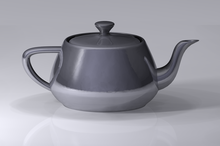Martin Newell (computer scientist)
Martin Edward Newell | |
|---|---|
| Nationality | English American |
| Alma mater | University of Utah |
| Known for | Utah Teapot[1] Newell's algorithm |
| Awards | Elected member of the National Academy of Engineering |
| Scientific career | |
| Institutions | CADCentre University of Utah Xerox PARC CADLINC Ashlar Adobe |
| Thesis | The Utilization of Procedure Models in Digital Image Synthesis (1975) |
| Website | academic |
Martin Edward Newell is a British-born computer scientist specializing in computer graphics who is perhaps best known as the creator of the Utah teapot computer model.
Career
[edit]Before emigrating to the US, he worked at what was then the Computer-Aided Design Centre (CADCentre) in Cambridge, UK,[2] along with his brother Dick Newell (who went on to co-found two of the most important UK graphics software companies – Cambridge Interactive Systems (CIS) in 1977 and Smallworld in 1987). At CADCentre, the two Newells and Tom Sancha developed Newell's algorithm, a technique for eliminating cyclic dependencies when ordering polygons to be drawn by a computer graphics system.[3][4][5]

Newell developed the Utah teapot while working on a Ph.D. at the University of Utah,[1][6] where he also helped develop a version of the painter's algorithm for rendering. He graduated in 1975, and was on the Utah faculty from 1977 to 1979.[7] Later he worked at Xerox PARC, where he worked on JaM, a predecessor of PostScript. JaM stood for "John and Martin" – the John was John Warnock, co-founder of Adobe Systems.[8]
Newell departed Xerox PARC to join CADLINC Inc.,[9] a factory automation startup, as VP of Advanced Development. There he led the development of a variety of CAD/CAM software applications, such as CimCAD (a 3-D drafting program) [10] and Intelligent Documentation [11] (an early electronic document editor integrating text, graphics, and information from relational databases).
He departed CADLINC to found the computer-aided design software company Ashlar in 1988.[7] In 2007, Newell was elected a member of the National Academy of Engineering for contributions to computer-graphics modeling, rendering, and printing.[12] He recently retired as an Adobe Fellow at Adobe Systems.
References
[edit]- ^ a b Torrence, A. (2006). "Martin Newell's original teapot". ACM SIGGRAPH 2006 Teapot on - SIGGRAPH '06. p. 29. doi:10.1145/1180098.1180128. ISBN 1595933646. S2CID 23272447.
- ^ van Dam, Andries (1998), "Some Personal Recollections on Graphics Standards", SIGGRAPH Computer Graphics Newsletter, 32 (1), archived from the original on 20 December 2016, retrieved 26 January 2010.
- ^ Sutherland, E. E.; Sproull, R. F.; Schumacker, R. A. (1974). "A Characterization of Ten Hidden-Surface Algorithms". ACM Computing Surveys. 6: 1–55. doi:10.1145/356625.356626. S2CID 14222390.
- ^ Newell, M. E.; Newell, R. G.; Sancha, T. L. (1972). "A solution to the hidden surface problem". Proceedings of the ACM annual conference on – ACM'72. Vol. 1. p. 443. doi:10.1145/800193.569954. S2CID 13829930.
- ^ Martin Newell publications indexed by Microsoft Academic
- ^ Newell, Martin (1975). The Utilization of Procedure Models in Digital Image Synthesis (PhD thesis). University of Utah. ProQuest 302791043.
- ^ a b History of the University of Utah School of Computing, retrieved 2010-01-26.
- ^ Adobe Co-founder John Warnock on the Competitive Advantages of Aesthetics and the 'Right' Technology, Knowledge@Wharton, The Wharton School, 20 January 2010.
- ^ "Origins & Early Development of Scalable Digital Type Fonts at Xerox PARC : History of Information".
- ^ "CADLINC IMPLEMENTS ITS CIM CAD 3D PACKAGE FOR SUN's 386i WORKSTATIONS". February 1989.
- ^ "CIMLINC INCORPORATED Trademarks :: Justia Trademarks".
- ^ Dr. Martin E. Newell in the NAE Members Directory, retrieved 2014-06-27.
Page Template:Asbox/styles.css has no content.
